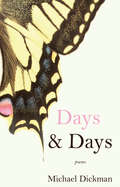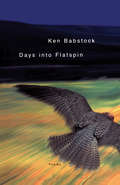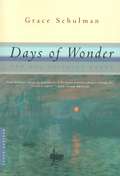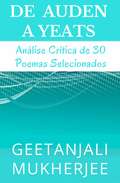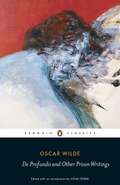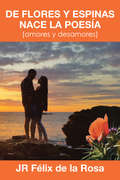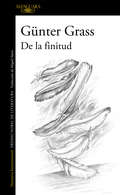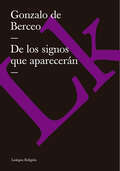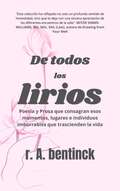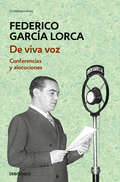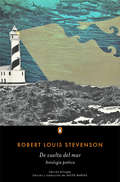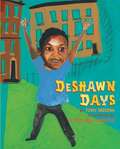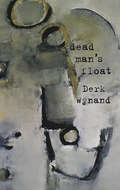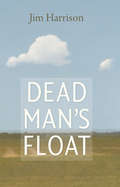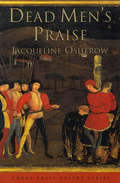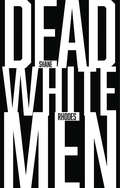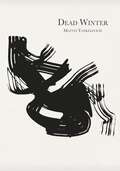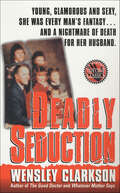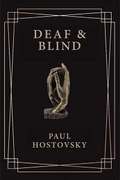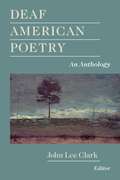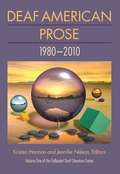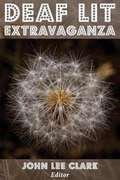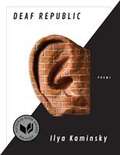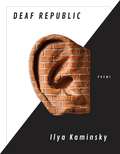- Table View
- List View
Days & Days: Poems
by Michael DickmanAn exhilarating and far-ranging meditation on days and how we live in them in the twenty-first century, from the award-winning poet.Michael Dickman's intuitive, agile verse captures us in its unusual pulse. Image-driven and shape-driven, the poems of Days & Days touch on parenthood, childhood, local natural habitats, graffiti culture, roses, and romantic love. Dickman considers both the internal and external vistas that open before him in the course of a day, the memories and the immediate quandaries. The long centerpiece poem, "Lakes Rivers Streams," is a reverie that picks up the flotsam of parenting days on its current. Other poems account for hotel days, or days spent watching TV, taking prescription drugs, watching butterflies. Throughout, we feel the dazzling originality of Dickman's awareness; he meets the brutality, banality, and strange beauty of the quotidian with a level gaze, and with an urgent musicality that carries us beyond these lines and pages.
Days Into Flatspin: Poems
by Ken BabstockDays into Flatspin is Ken Babstock's extraordinary second collection and it reveals a poet in full flight, fearless and technically brilliant. Diving into and then beyond what is seen or the coma of looking as one poem calls it, Babstock veers into the inner core of things, animals, and places through portals that exist all around us -- clothing, banisters, marshes, locks, wounds. And these are always entry points, always a means by which to go forward and further into, forcing decisions about whether to continue on or retreat and revealing that we rarely have any choice at all. Babstock opens everything to investigation, rupturing the limitations of the eye and the strictures of the poetic form: a sonnet is built from a Frisbee game, a love poem inspired by a cow, a gash inhabited by a field of crickets. And throughout his poetic landscape is a solitary bird -- watching, passing overhead, biding time, always present. Days into Flatspin is a soaring collection.
Days of Wonder
by Grace SchulmanAttesting to Grace Schulman's gifts for her craft, Days of Wonder collects verse spanning nearly three decades, including ten new poems and selections from the poet's four previous collections. Schulman's well-crafted lyrics contain equal portions of reverence and lament, praise and joy. Many of her poems communicate a sense of wonder at the beauty of the world, with references to painters and poets and religion. As William Stafford has written, Schulman "renews our faith in ourselves and in the language we use for finding each other."
De Auden a Yeats: Análise Crítica de 30 Poemas Selecionados
by Geetanjali Mukherjee Allan Felipe Rocha PenoniEste livro é uma referência pronta para alunos de Literatura Inglesa que querem ajuda para navegar pela poesia de alguns dos maiores poetas do final do século XIX e do século XX. O livro contém análises críticas profundas de 30 poemas selecionados das obras de W.H. Auden, Ted Hughes, John Keats, Philip Larkin e W.B. Yeats. Uma coletânia de 30 ensaios, o livro objetiva ajudar que alunos de literatura tenham uma visão geral da vida e do trabalho de casa poeta representado, assim como entender os poemas discutidos com suficiente profundidade. CARACTERÍSTICAS DO LIVRO * Uma seção sobre a vida e o histórico de cada poeta, para melhor entender as influências em sua poesia, e ter uma visão do contexto dos poemas selecionados * Uma explanação simples de cada poema * Explanações dos temas, motivos e símbolos usados nos poemas * Um ensaio dedicado para cada poema selecionado, analisando-os para o benefício do estudante de literatura * Perguntas curtas para que os alunos pensem sobre os temas mais profundos dos poemas Este é um guia inestimável para de literatura inglesa na escola ou universidade, ou para qualquer um que deseje obter uma compreensão mais apurada de alguns dos poemas mais reconhecidos do último século. Este livro funciona melhor como um guia de estudos, e não deve substituir a leitura de fato dos poemas (POEMAS NÃO INCLUSOS). Alguns poemas discutidos: * W.H. Auden - Refugee Blues * Ted Hughes - Crow Tyrannosaurus * Philip Larkin - The Whitsun Weddings * John Keats - To Autumn * W.B. Yeats - The Second Coming
De Profundis and Other Prison Writings
by Oscar WildeDe Profundis and Other Prison Writings is a new selection of Oscar Wilde's prison letters and poetry in Penguin Classics, edited and introduced by Colm Tóibín.At the start of 1895, Oscar Wilde was the toast of London, widely feted for his most recent stage success, An Ideal Husband. But by May of the same year, Wilde was in Reading prison sentenced to hard labour. 'De Profundis' is an epistolic account of Oscar Wilde's spiritual journey while in prison, and describes his new, shocking conviction that 'the supreme vice is shallowness'. This edition also includes further letters to his wife, his friends, the Home Secretary, newspaper editors and his lover Lord Alfred Douglas - Bosie - himself, as well as 'The Ballad of Reading Gaol', the heart-rending poem about a man sentenced to hang for the murder of the woman he loved. This Penguin edition is based on the definitive Complete Letters, edited by Wilde's grandson Merlin Holland. Colm Tóibín's introduction explores Wilde's duality in love, politics and literature. This edition also includes notes on the text and suggested further reading. Oscar Wilde was born in Dublin. His three volumes of short fiction, The Happy Prince, Lord Arthur Savile's Crime and A House of Pomegranates, together with his only novel, The Picture of Dorian Gray, won him a reputation as a writer with an original talent, a reputation enhanced by the phenomenal success of his society comedies - Lady Windermere's Fan, A Woman of No Importance, An Ideal Husband and The Importance of Being Earnest. Colm Tóibín is the author of five novels, including The Blackwater Lightship and The Master, and a collection of stories, Mothers and Sons. His essay collection Love in a Dark Time: Gay Lives from Wilde to Almodovar appeared in 2002. He is the editor of The Penguin Book of Irish Fiction.
De flores y espinas nace la poesía: (amores y desamores)
by JR Félix De la RosaSi crees en el amor (y en el desamor) estas poesías son para ti, porque nacen de tu propia experiencia. Este libro es un compendio de poesías de amor totalmente inspiradas en vivencias propias, válidas para cualquier lector que haya tenido, tenga o esté esperando una historia de amor, con sus rosas y espinas, esto es, con sus momentos dulces y otros no tan dulces. A fin de cuentas el amor es eso: sentimiento puro. Poesía pura.
De la finitud
by Günter GrassDe la finitud es el libro póstumo, la despedida del Premio Nobel de Literatura y Premio Príncipe de Asturias, Günter Grass. «Günter Grass nos ha dejado un conmovedor regalo de despedida. Creo que una vez más consiguió algo grande. Ha creado con su última obra de arte un impresionante juego de poesía, prosa e ilustración.»Gerhard Steidl (editor de Günter Grass) Entre diario, ensayo y poesía, y profusamente ilustrado por él mismo, De la finitud es el libro que Günter Grass escribió durante sus últimos años. En él hallamos la lúcida mirada, alejada de toda melancolía, de un hombre que se enfrenta a la muerte con ironía, en poemas como «Autorretrato» o «Adiós a la carne», al tiempo que sigue analizando el mundo que le rodea. Desfilan bajo su pluma llena de sabiduría, lirismo y humor los hechos y personajes más diversos, desde la crisis griega («La luz al final del túnel») ala canciller Angela Merkel («Mamá»). Un delicado regalo de despedida, un libro imprescindible. Reseñas:«Es un libro para la reflexión serena y el placer por las cosas profundas y bien hechas [...]. No todo el mundo sabe irse de la vida sin amargura, dejando a sus congéneres, a modo de propina literaria, un obsequio como este De la finitud.»Fernando Aramburu, El Mundo «Günter Grass escribió un último libro poético y conmovedor, íntimo y político, necesario. Uno de sus mejores libros.»Patricio Pron, Babelia «Un texto póstumo a modo de despedida preparado con mimo por el autor hasta sus últimos detalles... La constatación de la decadencia física se da la mano con una fuerte dosis de humor negro.»Elena Hevia, El Periódico de Catalunya «De la finitud es la última expresión viva de uno de los magos de un idioma mágico, el alemán.»Luis Meana, ABC Cultural «De la finitud es el mejor libro de Grass en años. Su muerte deja una obra distinta a todas las demás.»Jens Dirksen, Hamburger Abendblatt «Es una obra conmovedora y por momentos encantadora.»Heinrich Detering, Presidente de la Academia Alemana de Lengua y Literatura «De la finitud es una sólida obra póstuma de poesía, prosa y dibujos. Melancólico pero nunca sentimental. La franqueza de Günter Grass es admirable.»Friedmar Apel, Frankfurter Allgemeine «Una despedida llena de humor. El libro como una obra de arte, el libro como un libro, el último de Grass. Se ve el rastro de un hombre viejo que ha luchado ya sus batallas.»Volker Weidermann, Spiegel «Su último libro es francamente conciliador. De la finitud no es moralizador, es inusualmente autocrítico.»Burkhard Müller, Süddeutsche Zeitung «De la finitud es íntimo, melancólico, fanfarrón y alegre.»Matthias Hoening, Stern «Una obra de arte. De la finitud está lleno de una sensibilidad inusual y de una sana dosis de ironía y humor.»Jochen Kürten, DW. com
De los signos que aparecerán
by Gonzalo De BerceoScholarly poems that differ from the epics of minstrels.
De todos los Lírios: La poesía y la prosa que consagran esos momentos, lugares e individuos indelebles
by R. A. BentinckEn De todos los lirios, Bentinck “… libera a cada mujer para que se adueñe libremente de su sexualidad, ayudándola a apreciar que ella es mucho más que bragas y sostenes, pero que es digna del amor cotidiano. Señoras, todos necesitamos mantener esto cerca de la mesa de noche, ¡no se arrepentirán! Pero como mujer que a menudo se veía desafiada por muchas incertidumbres sociales y emocionales, la Reina natural de Bentinck fue liberadora y tranquilizadora; uno que me rescató de las inseguridades arraigadas durante mucho tiempo y la baja autoestima hacia esa búsqueda de "belleza natural impresionante". Para todas mis Hermanas en la encrucijada, el Sr. Bentinck nos ha dado un enfoque para que todos experimenten esas experiencias memorables, desaten nuestra belleza interior y emociones, repare y eleve cada alma confundida o rota. ¡Gracias, Randy! "
De viva voz: Conferencias y alocuciones
by Federico García LorcaLa totalidad de los textos escritos por Federico García Lorca para ser leídos en voz alta: conferencias, alocuciones e intervenciones públicas. Federico García Lorca es uno de los poetas y dramaturgos más célebres de nuestra literatura, y su amplia obra ha sido representada, leída, editada y estudiada desde que el poeta fue asesinado en 1936. Sin embargo, son poco conocidas sus conferencias y presentaciones en público, un conjunto que se ha publicado de forma muy dispersa. Este volumen presenta por primera vez la totalidad de esas charlas y alocuciones, e incluye algunos textos inéditos de su madurez. Escritos para ser léidos en voz alta, todos tienen la particularidad de mostrarnos las preocupaciones estéticas y sociales del gran autor granadino, acercándonos a su pensamiento de un modo fresco y directo. La edición está a cargo de Jesús Ortega y Víctor Fernández, quien ha editado de 2017 en adelante la biblioteca Lorca en Debolsillo, con una mirada renovadora de obras que parecían ya muy conocidas.
De vuelta del mar: Antología poética
by Robert L. StevensonUna antología poética de Robert Louis Stevenson con una selección y traducción de Javier Marías. «Aquí yace donde quiso yacer;de vuelta del mar está el marinero,de vuelta del monte está el cazador.» Luis Antonio de Villena advierte que el nombre de Robert Louis Stevenson se suele asociar a cuatro cosas: la prosa, las aventuras, la enfermedad y la lucha contra ésta, así como el exotismo. Muchos añadirían también la adolescencia como demuestra, dice Villena, tanto la propia obra de Stevenson como el recuerdo biográfico de muchos de sus lectores. No obstante, los sesenta y seis poemas que conforman este volumen revelan otra faceta desconocida y fascinante del autor de La isla del tesoro, la del poeta. Javier Marías ha llevado a cabo una minuciosa selección de los poemas más valiosos y destacados de Stevenson y presenta una magnífica traducción. La introducción de Luis Antonio de Villena acompaña la lectura de los poemas.
De vuelta del mar: Antología poética
by Robert L. StevensonUna antología poética de Robert Louis Stevenson con una selección y traducción de Javier Marías. «Aquí yace donde quiso yacer;de vuelta del mar está el marinero,de vuelta del monte está el cazador.» Luis Antonio de Villena advierte que el nombre de Robert Louis Stevenson se suele asociar a cuatro cosas: la prosa, las aventuras, la enfermedad y la lucha contra ésta, así como el exotismo. Muchos añadirían también la adolescencia como demuestra, dice Villena, tanto la propia obra de Stevenson como el recuerdo biográfico de muchos de sus lectores. No obstante, los sesenta y seis poemas que conforman este volumen revelan otra faceta desconocida y fascinante del autor de La isla del tesoro, la del poeta. Javier Marías ha llevado a cabo una minuciosa selección de los poemas más valiosos y destacados de Stevenson y presenta una magnífica traducción. La introducción de Luis Antonio de Villena acompaña la lectura de los poemas.
DeShawn Days
by Tony Medina R. Gregory ChristieI'm DeShawn Williams I'm ten years old come see who I live with -- who I love! From this inviting opening, we are swept into ten-year-old DeShawn's world where we meet his family, his friends, and learn about his hopes and dreams. DeShawn lives in the projects, where "You don't just hear music / you hear sirens too /cop cars and ambulances /screaming all the time /real loud at you." This is also a place where neighbors gather for barbecues, and where DeShawn and his cousin build a snowman in the winter. We experience the death of DeShawn's grandmother, deeply feeling his sadness and loss. And we share the hope as he and his mother turn to each other for comfort. Readers from all backgrounds will be charmed by this upbeat, compassionate, and creative young boy.
Dead Man's Float
by Derk WynandDead Man's Float details that sad emblem of Western alienation, the tourist couple in their rented tropical Eden. Here life is temporary and not at all cheap. The wildlife is spectacular, the culture incomprehensible, and the locals politely try to hide their hilarity at Canadian pidgin Spanish. Heat, beaches, ruins -- why did we think they could distract us from domestic squabbling or the 3 a.m. dreads? Derk Wynand wrings wry existential meditations from firsthand experience of the Exotic -- the First World and the Third in their ritual winter dance.
Dead Man's Float
by Jim Harrison"Harrison's poems succeed on the basis of an open heart and a still-ravenous appetite for life."-The Texas ObserverThe title Dead Man's Float is inspired by a technique used by swimmers to conserve energy when exhausted, to rest up for the long swim to shore. In his fourteenth volume of poetry, Jim Harrison presents keen awareness of physical pains, delights in the natural world, and reflects on humanity's tentative place in a universe filled with ninety billion galaxies. By turns mournful and celebratory, these fearless and exuberant poems accomplish what Harrison's poems always do: wake us up to the possibilities of being fully alive."Forthright and unaffected, even brash, Harrison always scoops us straight into the world whether writing fiction or nonfiction. This new collection [Dead Man's Float] takes its cue from a technique swimmers use to conserve energy in deep water, and Harrison goes in deep, acknowledging our frailness even as he seamlessly connects with a world that moves from water to air to the sky beyond."-Library Journal"Harrison pours himself into everything he writes... in poems, you do meet Harrison head-on. As he navigates his seventies, he continues to marvel with succinct awe and earthy lyricism over the wonders of birds, dogs, and stars as he pays haunting homage to his dead and contends with age's assaults. The sagely mischievous poet of the North Woods and the Arizona desert laughs at himself as he tries to relax by imagining that he's doing the dead man's float only to sink into troubling memories...Bracingly candid, gracefully elegiac, tough, and passionate, Harrison travels the deep river of the spirit, from the wailing precincts of a hospital to a "green glade of soft marsh grass near a pool in a creek" to the moon-bright sea."-Donna Seaman, Booklist"Harrison doesn't write like anyone else, relying entirely on the toughness of his vision and intensity of feeling."-Publishers WeeklyWarblerThis year we have two gorgeousyellow warblers nesting in the honeysuckle bush.The other day I stuck my head in the bush.The nestlings weigh one twentieth of an ounce,about the size of a honeybee. We stared ateach other, startled by our existence.In a month or so, when they reach the sizeof bumblebees they'll fly to Costa Rica without a map.Jim Harrison, one of America's most versatile and celebrated writers, is the author of over thirty books of poetry, fiction, and nonfiction-including Legends of the Fall, the acclaimed trilogy of novellas. With a fondness for open space and anonymous thickets, he divides his time between Montana and southern Arizona.
Dead Men's Praise: Poems (Grove Press Poetry Series)
by Jacqueline OsherowA witty and formally versatile collection of poetry exploring life, faith, and history by the Witter Bynner Prize-winning poet.With Dead Men’s Praise, Jacqueline Osherow gives us her fourth and most ambitious collection of poetry to date. Her hybrid inspiration ranges from Dante’s terza rima, to free verse, to biblical psalms, all delivered in a casually conversational voice. Combining the self-mocking inflections of Yiddish jokes with the pure lyric inspiration of biblical verse, these poems range in theme from Italian hill towns to contemporary art installations in Los Angeles to the vanished Jewish world of the Ukraine. Her effortless humor and sharp insights take us from imaginings of the future to recovery of the past, and her distinctive voice becomes a fusion of the sublime and the down-to-earth.“Like Elizabeth Bishop, who wove her voice into a sestina so effortlessly you forget the form is there, Osherow makes villanelles, sonnets, and even Dante’s terza rima feel genuinely conversational.” —David Yaffe, The Village Voice
Dead White Men
by Shane RhodesA vital collection that interrogates the stories of the dead white men that litter our histories and landscapes. Juxtaposing the seemingly benign names of Europeans that permeate our geographies with the details of their so-called discoveries and conquests, Dead White Men turns ideas of exploration, discovery, finding and keeping back upon themselves. Engaging with exploration and scientific texts from the fifteenth to the nineteenth centuries – texts wrapped up in the history and ongoing present of colonization – this collection builds a fascinating poetry of memory out of histories that are largely forgotten. ‘A provocative and galvanizing read … Riveting and dazzling invention is visible on almost every page: fonts shift size, language cascades and cleaves, and images disrupt order. Dead White Men should be widely read and taught.’ – Eduardo C. Corral, author of Slow Lightning ‘Dead White Men is not only a searing indictment of colonialism but also a painful reminder of the violence that underpins the logic of exploration. Each poem strikes at the heart of the issue: there are often unarticulated, unacknowledged Indigenous presences here that have been flattened over by the lies and mirages of empty landscapes. Dead White Men is a stinging and difficult journey, and one that continues to remind us that stolen land has always been the most pressing concern for Indigenous peoples and settlers. This is an absolutely essential book.’ – Jordan Abel, author of Injun
Dead Winter
by Matvei YankelevichThese twenty-seven poems of Dead Winter continue the poet’s ongoing “From a Winter Notebook” cycle which plays on traditional winter themes of stasis, ruin, aging, lost love, belatedness, dormancy, and decline. Aggressively personal, by turns ironic and sentimental, mixing colloquial and archly artificial diction, rife with quotations and reference to a wide variety of lyric traditions, these poems stage a polyphonic and ambivalent internal dialog that vacillates between the often-contradictory desires of social justice and personal freedom. Straining to resist impending erosion in the political tide, the singular voice seeks to hold these contradictions up to the light and to contemplate their prismatic refractions without resolution. Caught between complicity and antagonism, between the impending obsolescence of inherited poetic traditions and a desire to commune with the contemporary, the voice churns on—miming winter’s monotony—to carve out a space for melancholic complaint and anxious meditation on the end-times endeavor of the lyric mode itself. Through representations of desire and melancholy in a technologically invasive era, these poems also ask about the effect of technological and political shifts on the bounds of the personal, and of the way a techno-oriented sociality impinges on interpersonal relationships, the interior dialogs of the self, and the writing of poetry.
Deadly Seduction (St. Martin's True Crime Classics)
by Wensley Clarkson***Please note: This ebook edition does not contain the photos found in the print edition.***Young, Glamorous and Sexy, She Was Every Man's Fantasy...And A Nightmare of Death For Her Husband.She Hid Her Criminal Past...Prominent Indiana attorney Jimmy Grund thought he'd found the woman of his dreams when he wed his second wife Susan. But beneath the silky blond society lady lurked a calculating, evil-tempered seductress whose murderous future was about to rival her sordid past.She Plotted A Brutal Murder...While she hid her previous marriages and an appalling crime from Jimmy, she was soon plotting to get her hands on his fortune. When Jimmy Grund finally found out the truth about his wife, he told her he was divorcing her. But no one left Susan Grund.She Killed Her Husband With A Gun Stolen From His Own Son...All of Peru, Indiana was stunned when it was revealed the fatal bullet came from a gun stolen from young David Grund. Yet even that paled next to Susan's incredible testimony that she had carried on a two-year affair with the innocent teenager, who denied the affair and was not implicated in the crime.Wensley Clarkson's Deadly Seduction is the story of a real femme fatale, who spun a web of deceit and murder that shocked an entire town.
Deaf & Blind
by Paul HostovskyA collection of poems and stories about Deaf and DeafBlind people, ASL and Braille.
Deaf American Poetry: An Anthology
by John Lee Clark<p>“The Deaf poet is no oxymoron,” declares editor John Lee Clark in his introduction to <i>Deaf American Poetry: An Anthology</i>. The 95 poems by 35 Deaf American poets in this volume more than confirm his point. From James Nack’s early metered narrative poem “The Minstrel Boy” to the free association of Kristi Merriweather’s contemporary “It Was His Movin’ Hands Be Tellin’ Me,” these Deaf poets display mastery of all forms prevalent during the past two centuries. Beyond that, E. Lynn Jacobowitz’s “In Memoriam: Stephen Michael Ryan” exemplifies a form unique to Deaf American poets, the transliteration of verse originally created in American Sign Language. <p>This anthology showcases for the first time the best works of Deaf poets throughout the nation’s history — John R. Burnet, Laura C. Redden, George M. Teegarden, Agatha Tiegel Hanson, Loy E. Golladay, Robert F. Panara, Mervin D. Garretson, Clayton Valli, Willy Conley, Raymond Luczak, Christopher Jon Heuer, Pamela Wright-Meinhardt, and many others. Each of their poems reflects the sensibilities of their times, and the progression of their work marks the changes that deaf Americans have witnessed through the years. In “The Mute’s Lament,” John Carlin mourns the wonderful things that he cannot hear, and looks forward to heaven where “replete with purest joys/My ears shall be unsealed, and I shall hear.” In sharp contrast, Mary Toles Peet, who benefitted from being taught by Deaf teachers, wrote “Thoughts on Music” with an entirely different attitude. She concludes her account of the purported beauty of music with the realization that “the music of my inward ear/Brings joy far more intense.” <p>Clark tracks these subtle shifts in awareness through telling, brief biographies of each poet. By doing so, he reveals in <i>Deaf American Poetry</i> how “the work of Deaf poets serves as a prism through which Deaf people can know themselves better and through which the rest of the world can see life in a new light.”</p>
Deaf American Prose, 1980–2010
by Jennifer L. Nelson Kristen C. HarmonIn Deaf life, the personal narrative holds sway because most Deaf individuals recall their formative years as solitary struggles to understand and to be understood. Few deaf people in the past related their stories in written form, relying instead on a different kind of "oral" tradition, that of American Sign Language. During the last several decades, however, a burgeoning bilingual deaf experience has ignited an explosion of Deaf writing that has pushed the potential of ASL-influenced English to extraordinary creative heights. Deaf American Prose: 1980-2010 presents a diverse cross-section of stories, essays, memoirs, and novel excerpts by a remarkable cadre of Deaf writers that mines this rich, bilingual environment. The works in Deaf American Prose frame the Deaf narrative in myriad forms: Tom Willard sends up hearing patronization in his wicked satire "What Exactly Am I Supposed to Overcome?" Terry Galloway injects humor in "Words," her take on the identity issues of being hard of hearing rather than deaf or hearing. Other contributors relate familiar stories about familiar trials, such as Tonya Stremlau's account of raising twins, and Joseph Santini's short story of the impact on Deaf and hearing in-laws of the death of a son. The conflicts are well-known and heartfelt, but with wrinkles directly derived from the Deaf perspective. Several of the contributors expand the Deaf affect through ASL glosses and visual/spatial elements. Sara Stallard emulates ASL on paper through its syntax and glosses, and by eliminating English elements, a technique used in dialogue by Kristen Ringman and others. Deaf American Prose features the work of other well-known contemporary Deaf writers, including co-editor Kristen Harmon, Christopher Jon Heuer, Raymond Luczak, and Willy Conley. The rising Deaf writers presented here further distinguish the first volume in this new series by thinking in terms of what they can bring to English, not what English can bring to them.
Deaf Lit Extravaganza
by John Lee ClarkThis celebration of short stories, poems, and essays gives us a glimpse into the Deaf signing community, something that literature by hearing authors featuring deaf characters has rarely done. Between these covers, a Deaf couple fights over their son's language use, an Australian woman joins the community as an adult, a Deaf woman's body is fished out a dumpster, and a British Deaf poet wants to keep "zombies"-hearing people-out.
Deaf Republic: Poems
by Ilya KaminskyFinalist for the National Book Award*Finalist for the PEN/Jean Stein Award*Finalist for the National Book Critics Circle Award* Winner of the Los Angeles Times Book Prize*Winner of the Anisfield-Wolf Book Award*Winner of the National Jewish Book Award*Finalist for the Kingsley Tufts Poetry Award *Finalist for the T. S. Eliot Prize* Finalist for the Forward Prize for Best Collection Ilya Kaminsky's astonishing parable in poems asks us, What is silence? This book opens in an occupied country in a time of political unrest. When soldiers breaking up a protest kill a deaf boy, Petya, the gunshot becomes the last thing the citizens hear--they all have gone deaf, and their dissent becomes coordinated by sign language. The story follows the private lives of townspeople encircled by public violence: a newly married couple, Alfonso and Sonya, expecting a child; the brash Momma Galya, instigating the insurgency from her puppet theater; and Galya's girls,heroically teaching signing by day and by night luring soldiers one by one to their deaths behind the curtain. At once a love story, an elegy, and an urgent plea, Ilya Kaminsky's long-awaited Deaf Republic confronts our time's vicious atrocities and our collective silence in the face of them.
Deaf Republic: Poems
by Ilya KaminskyFinalist for the National Book Award • Finalist for the PEN/Jean Stein Award • Finalist for the National Book Critics Circle Award • Winner of the Los Angeles Times Book Prize • Winner of the Anisfield-Wolf Book Award • Winner of the National Jewish Book Award • Finalist for the Kingsley Tufts Poetry Award • Finalist for the T. S. Eliot Prize • Finalist for the Forward Prize for Best CollectionIlya Kaminsky’s astonishing parable in poems asks us, What is silence?Deaf Republic opens in an occupied country in a time of political unrest. When soldiers breaking up a protest kill a deaf boy, Petya, the gunshot becomes the last thing the citizens hear—they all have gone deaf, and their dissent becomes coordinated by sign language. The story follows the private lives of townspeople encircled by public violence: a newly married couple, Alfonso and Sonya, expecting a child; the brash Momma Galya, instigating the insurgency from her puppet theater; and Galya’s girls, heroically teaching signing by day and by night luring soldiers one by one to their deaths behind the curtain. At once a love story, an elegy, and an urgent plea, Ilya Kaminsky’s long-awaited Deaf Republic confronts our time’s vicious atrocities and our collective silence in the face of them.
